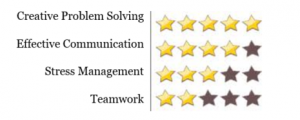COMPETE! Project makes progress in the game development addressed to recent graduates

COMPETE! Project starts in October 2019, aiming to foster the transversal competences of university students, and therefore their employability, through the development of a videogame.
The initial analysis phase consists, firstly, on the development of surveys and questionnaires to students and employers to identify the required competences in the labour market. Secondly, a study about the current videogames existing in the market is implemented, identifying key elements for the successful delivery of the final product.
As a result of the initial analysis, 4 competences are identified to be taught through the videogame:
- Creative problem solving
- Effective communication
- Stress management
- Teamwork
Starting from those competences, UNIR, leader of the game development, tailors a first design approved by the project consortium.
The game is framed in a metaphoric scenario where the player becomes a character that must execute different tasks while interacting with the environment and with virtual agents that help her to accomplish the assigned missions. The competences are assessed throughout the story, depending on the decisions taken by the player, which increase or decrease the score in each of the four competences.
The story begins when the player is offered a job position as Project Manager on an exotic island, with the objective of developing the local economy in a sustainable way while maintaining the happiness of the island inhabitants. Both markers are continuously assessed throughout the game, together with the four competences. In addition, the player has a limited time to execute the assigned commitments in 10 different situations.
By doing so, the player develops the four identified competences, meeting the main target of the project: fostering employability and personal and socio-educational development.
The game is tested in a pilot phase by teachers and educators from the universities participating in the project. After the trial, the lasts adjustments are implemented, based on the received feedback. The game is finally launched to the open public after the final consortium validation.


